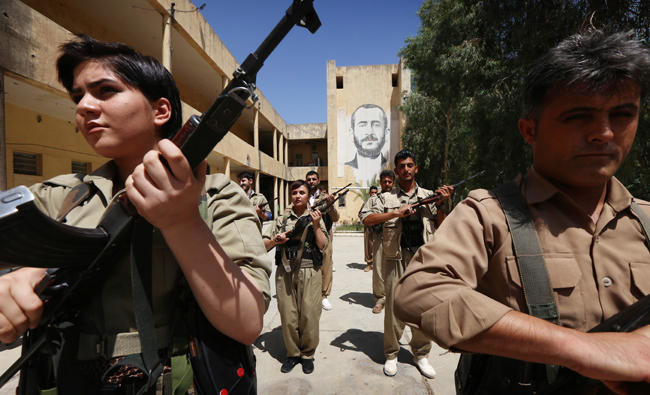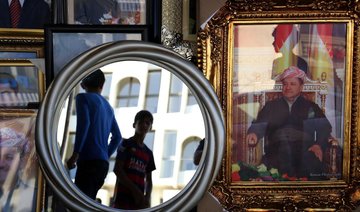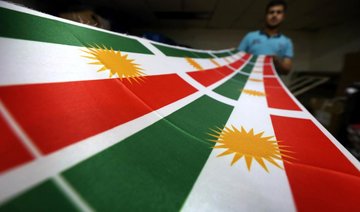KOYSINJAQ: Plans for an independence referendum in Iraqi Kurdistan have angered Ankara and Tehran, but little has changed for Iranian Kurdish rebels at rear bases in the mountains of northern Iraq.
A spokesman for the Democratic Party of Iranian Kurdistan (PDKI) said reports of a joint Turkish-Iranian military operation against Kurdish rebels in Iraq were mainly intended to unsettle Iraqi Kurds.
Speaking in Koysinjaq, 60 km east of the autonomous region’s capital Irbil, Aso Hassan Zada said Iran and Turkey had only one shared interest — their opposition to the Sept. 25 referendum.
Both countries fear it could stir separatist aspirations among their own sizeable Kurdish minorities.
“Neither country will help the other without something in return,” he said as armed, uniformed men and women trained outside in a courtyard plastered with portraits of their rebel movement’s founders.
The central government in Baghdad has said the non-binding referendum violates Iraq’s constitution.
Coming as Iraqi forces backed by an international coalition battle Daesh in Iraq and Syria, it has also stoked opposition from Washington and Western countries.
Turkish President Recep Tayyip Erdogan said last month that a joint Turkish-Iranian operation against Iraq-based Kurdish rebels from the two countries was “always on the agenda.”
Turkey has battled the outlawed Kurdistan Workers’ Party (PKK) for decades, while Iranian security forces have fought the PDKI and a PKK affiliate, the Party of Free Life of Kurdistan (PJAK).
Iran, while equally opposed to the referendum, swiftly denied Erdogan’s claim of any planned operation inside Iraqi Kurdistan.
But its elite Revolutionary Guards warned: “As always we will strongly confront any group, team or person who wants to penetrate into Iran’s territory for anti-security or terrorist operations.”
From another mountain base, Zelan Vejin, a leader of the PJAK whose fighters also operate along the border with Iran, shrugged off the threat of any joint operation.
“It’s impossible that Iran and Turkey operate together” because of their divergent political aims, she said.
Besides, she added, “Iran always undertakes military actions in secret, never disclosing its intentions, whereas Turkey pre-announces its campaigns.”
The PDKI’s Zada said Ankara prioritizes fighting the PKK inside Turkey and on Iraqi and Syrian territory, while Tehran’s goal is to clear its Iraqi border of PDKI and PJAK militants.
Ankara and Tehran have carried out a string of separate military operations against Kurdish rebel bases in the mountains of northern Iraq.
“Our fighters have observed repeated incursions into Iraqi territory by Iranian forces,” Zada said, adding that Iran had deployed artillery units right along the border.
If Iran and Turkey do launch operations, “we will step up our fight inside Iranian territory,” Vejin said.
“Iran has forever occupied our land but it has never managed to defeat us through military means. War does not frighten us,” she said.
Kurd rebels in Iraq mountains shrug off Turkey-Iran threats
Kurd rebels in Iraq mountains shrug off Turkey-Iran threats

Emirati observation satellite launches successfully from California

- MBZ-SAT was entirely developed by Emirati engineers at Mohammed bin Rashid Space Centre in Dubai
- Developers say it will enhance disaster-management by capturing high-res images of areas as small as 1 sq. meter
LONDON: The Emirati-developed observation satellite MBZ-SAT successfully launched on Tuesday evening from the Vandenberg Space Force Base in the US state of California.
Described by developers as the most advanced observation satellite in the Middle East, it was carried into space by a SpaceX Falcon 9 rocket, the Emirates News Agency reported.
The satellite was entirely developed by Emirati engineers at the Mohammed bin Rashid Space Centre in Dubai. Final testing by the team ahead of launch took place at SpaceX’s facilities in the US.
Developers said the satellite will enhance disaster-management efforts by continuously capturing high-resolution images that can reveal details in areas as small as 1 sq. meter.
120 civilians killed in artillery shelling in Sudan

PORT SUDAN: At least 120 civilians were killed in artillery shelling of western Omdurman on Tuesday as fighting between the Sudanese army and paramilitary forces escalated again.
Rescuers said medical supplies were in critically short supply as health workers struggled to treat “a large number of wounded people suffering from varying degrees of injuries” in the capital Khartoum’s twin city just across the Nile River.
Sudan has been at war since April 2023 between the forces of rival generals. Most of Omdurman is under army control, while the rival paramilitary Rapid Support Forces hold Khartoum North and some other areas of the capital.
Greater Khartoum residents on both sides of the Nile regularly report shelling across the river, with bombs and shrapnel often hitting homes and civilians. Both the army and the paramilitaries have been accused of targeting civilians, including health workers, and indiscriminately shelling residential areas.
Fighting has intensified in recent weeks. Port Sudan, the seat of Sudan's army-aligned government, was without power after a drone attack by the paramilitaries hit a hydroelectric dam in the north.
The war has killed up to 150,000 people, uprooted more than 12 million and pushed many Sudanese to the brink of famine.
Israelis, Gazans anxiously awaiting truce deal

- The attack, the deadliest in Israel’s history, resulted in the deaths of 1,210 people, mostly civilians, according to an AFP tally of official Israeli figures
JERUSALEM: Israelis and Gazans on Tuesday anxiously awaited a long-sought truce deal, with relatives of hostages calling for their release, and displaced Palestinians praying for a chance to return home.
Multiple officials from mediating countries involved in the negotiations have said a deal on a ceasefire and hostage-prisoner exchange is closer than ever, with Qatar saying negotiations were in their “final stages.”
In Israel, since the early morning, the families of hostages and their supporters gathered outside the parliament and the office of Prime Minister Benjamin Netanyahu to demand that every effort be made to secure a deal after months of disappointment.
“Time is of the essence, and time does not favor the hostages,” said Gil Dickmann, cousin of former hostage Carmel Gat, whose body was recovered from a Gaza tunnel in September.
“Hostages who are alive will end up dead. Hostages who are dead might be lost,” Dickmann said at a rally in Jerusalem. “We have to act now.”
Earlier on Tuesday, Dickmann and several other relatives of hostages still being held in Gaza met with Netanyahu to press him to agree to a deal.
“If we stop the war, we will receive all the hostages immediately,” said Eli Shtivi, father of former hostage Ilan Shtivi.
“So, that is what needs to be done.”
The war in Gaza erupted after Hamas’s unprecedented attack on Israel on October 7, 2023.
The attack, the deadliest in Israel’s history, resulted in the deaths of 1,210 people, mostly civilians, according to an AFP tally of official Israeli figures.
On that day, militants also took 251 people hostage, of whom 94 remain in Gaza, including 34 the Israeli military says are dead.
Israel’s retaliatory campaign in Gaza has since killed 46,645 people, the majority civilians, according to the health ministry in the Hamas-run territory, whose figures are considered reliable by the UN.
The extensive military offensive has left much of Gaza in ruins, displacing most of its residents during the course of more than 15 months of war.
The longing to end the war is deeply felt in Gaza as well.
“I’m anxiously awaiting the truce. I will cry for days on end,” said Umm Ibrahim Abu Sultan, a resident of Gaza City now living in Khan Yunis after being displaced along with her five children. “We lost everything.”
She expressed disbelief at the possibility of reuniting with her husband, who remained in Gaza City.
“I’m waiting for the announcement of the agreement. I just want to go back to my home, my area, and my family. It feels like we’re coming back from the dead,” she said.
Displaced Gazan Hassan Al-Madhoun said he had been waiting for 15 months for a deal.
“I can’t even imagine how I’ll feel when we return to Jabalia and to our destroyed home,” he said.
“It will take time to process the extent of the loss. The martyrs are still buried under the rubble.”
Back in Israel, however, not everyone was in favor of a ceasefire.
“They (Hamas) need to raise their hands and say, ‘That’s it. We’re giving you the hostages back because you won,’ and that’s not what’s happening,” said Barbara Haskel at a rally protesting the proposed deal.
Palestinian health ministry says Israeli air strike kills 6 in West Bank

- The Palestinian ministry said among those killed was 15-year-old Mahmud Ashraf Mustafa Gharbiya
- Israeli forces make frequent raids on Palestinian towns and villages in the West Bank, which Israel has occupied since 1967
JENIN, Palestinian Territories: The Palestinian health ministry said Tuesday that an Israeli air strike on the Jenin refugee camp in the occupied West Bank killed six people, including a teenager, with the Israeli military confirming it carried out an attack in the area.
“There are six martyrs and several injured as a result of the Israeli bombing of Jenin refugee camp,” the Ramallah-based ministry said in a statement.
The Israeli military did not offer details but said it had carried out “an attack in the Jenin area.”
The Palestinian ministry said among those killed was 15-year-old Mahmud Ashraf Mustafa Gharbiya.
Palestinian security forces of the Ramallah-based Palestinian Authority (PA) slammed the raid by the Israeli military.
“The pre-planned intervention ... thwarts all efforts being made to maintain security and order and restore life to normal,” said Anwar Rajab, spokesman for the Palestinian forces, in a statement.
“It reflects the occupation’s premeditated intentions to disrupt every national endeavour aimed at protecting our people.”
Israeli forces make frequent raids on Palestinian towns and villages in the West Bank, which Israel has occupied since 1967.
Violence in the territory has soared since the war in Gaza broke out on October 7, 2023.
Israeli troops or settlers have killed at least 831 Palestinians in the West Bank since the start of the Gaza war, according to the health ministry.
At least 28 Israelis have been killed in Palestinian attacks or during Israeli military raids in the territory over the same period, according to Israeli official figures.
In recent weeks Jenin has also seen intra-Palestinian violence, with PA forces clashing with militants.
The clashes broke out amid a major PA raid on the Jenin camp after the December 5 arrest of a Jenin Battalion commander on charges of possessing weapons and illicit funds.
Armed factions in Jenin and elsewhere see themselves as offering more effective resistance to the Israeli occupation than the PA, which coordinates security matters with Israel.
Israeli foreign minister sees a majority in government to support Gaza agreement

- Gideon Saar said a majority in the Israeli government will support a hostage deal
JERUSALEM: Israeli Foreign Minister Gideon Saar said on Tuesday he believed there would be a majority in the government to support a Gaza hostage deal if one is finally agreed, despite vocal opposition from hard-line nationalist parties in the coalition.
“I believe that if we achieve this hostage deal, we will have a majority in the government that will support the agreement,” he said in a press conference in Rome with Italian Foreign Minister Antonio Tajani.




















